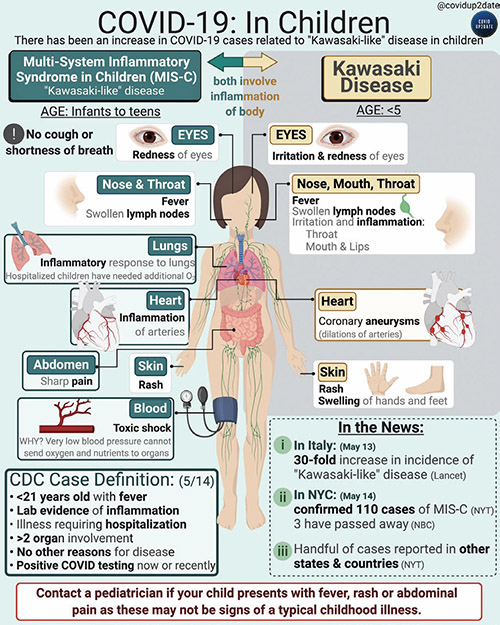
(Courtesy of St. Mary’s General Hospital) St. Mary’s General Hospital reminds people that our emergency room is open, safe and sterilized from COVID-19, and to NOT delay life-threatening symptoms! “Many of our patients have been living in pain and enduring other discomforts while delaying much-needed medical attention during this COVID-10 pandemic,” said Edward J. Condit, president and CEO of St. Mary’s General Hospital.
And we better take care of our needs before the next crisis—multisystem inflammatory syndrome in children (MIS-C) associated with COVID-19. What is MIS-C? It is a condition where different body parts can become inflamed, including the heart, lungs, kidneys, brain, skin, eyes, or gastrointestinal organs. The CDC does not yet know what causes MIS-C. However, they do know that many children with MIS-C had the virus that causes COVID-19 or had been around someone with COVID-19. MIS-C can be serious, even deadly, but most children who were diagnosed with this condition have gotten better with medical care.
What to do if you think your child is sick with MIS-C. Contact your child’s doctor or visit the emergency room right away if your child is showing symptoms of MIS-C:
- Fever
- Abdominal pain
- Vomiting
- Diarrhea
- Neck pain
- Rash
- Bloodshot eyes
- Feeling extra tired
Be aware that not all children will have all the same symptoms. Seek emergency care right away if your child is showing any of these emergency warning signs of MIS-C or other concerning signs:
- Trouble breathing
- Pain or pressure in the chest that does not go away
- New confusion
- Inability to wake or stay awake
- Bluish lips or face
- Severe abdominal pain
Sound familiar? Similar as COVID-19 that we have been living with for months. Now, this is not the pandemic of COVID-19, at least not today. However, let us use what we learned with COVID-19.
Your doctor may do certain tests to look for inflammation or other signs of disease, including blood tests, chest X-ray, echocardiogram, and/or abdominal ultrasound. And your doctor may provide medication. Most children who become ill with MIS-C will need to be treated in the hospital. Some will need to be treated in the pediatric intensive care unit (ICU).
What we do not know about MIS-C. CDC is still learning about MIS-C and how it affects children, so we do not know why some children have gotten sick with MIS-C and others have not. We also do not know if children with certain health conditions are more likely to get MIS-C. These are among the many questions CDC is working to try to understand and we will update our community as we learn more.
For additional information please contact the community liaison, George Matyjewicz, PhD. For more information, please visit www.smh-nj.com. For the latest updates, photos and videos, please follow and like St. Mary’s General Hospital’s Facebook page at www.facebook.com/stmarysgeneral.










